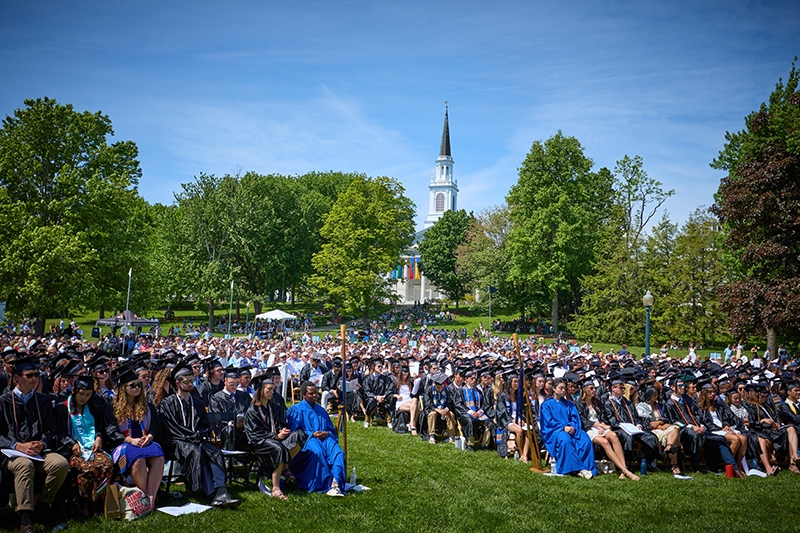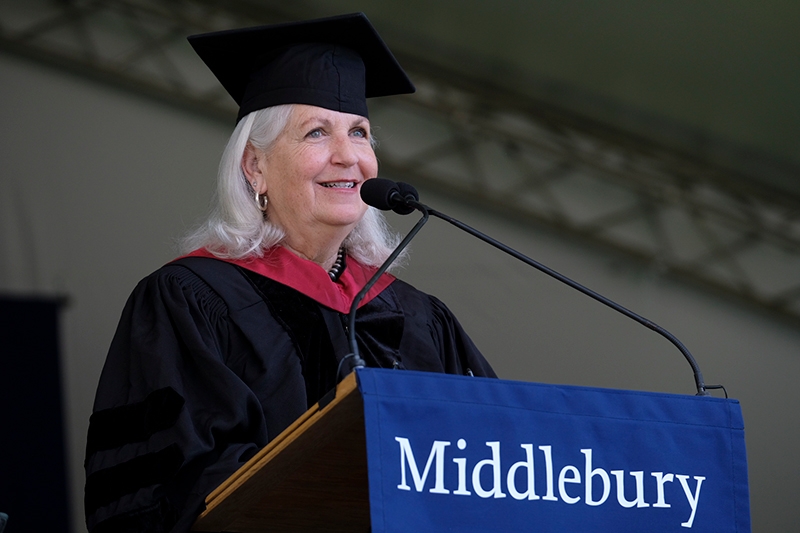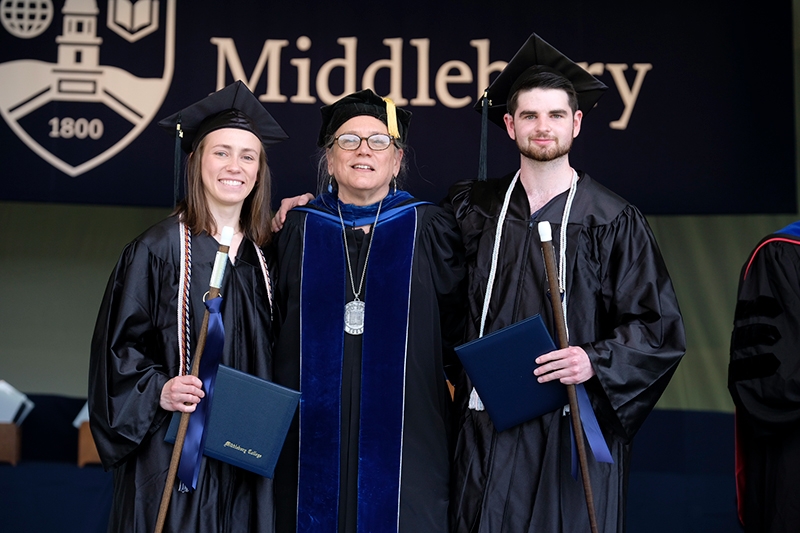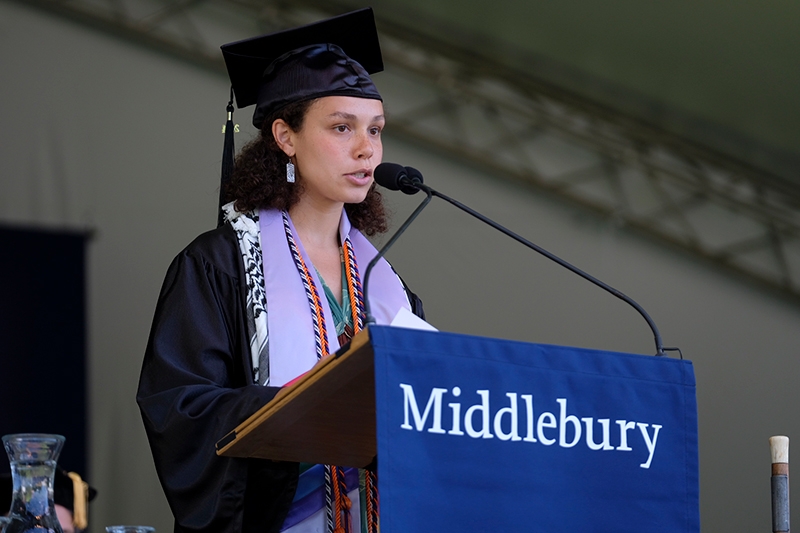Middlebury Celebrates Commencement for the Class of 2024
Faculty, staff, family, and friends joined the Middlebury College Class of 2024 on the Main Quad to celebrate Commencement on a picture perfect May morning Sunday, May 26. As graduates lined up for the procession, the high energy sounds of Middlebury’s Afropop music ensemble welcomed guests to the seating area.
Commencement Speaker Terry Tempest Williams
The ceremony included a keynote address by acclaimed author and environmentalist Terry Tempest Williams who encouraged the graduates to continue using their voices to bring about change in a world wracked with challenges—from climate change to war.

“Storms are blowing around the world, physically and metaphorically,” said Williams, who received an honorary doctor of humane letters degree on Sunday. “The winds of change are strong. We have a history of bravery in this country and we must call it forward now. A liveable future is guaranteed only by the degree of our personal engagement, the size of our hearts and our commitments to build trust in our capacity to work together. We can mobilize our creativity and care in the name of a just world for all–beyond our backyards, even beyond our own species.”
With a nod to students who protested the war in Gaza and Israel this spring, Williams, the author of more than 20 books including An Unspoken Hunger: Stories from the Field, noted the “dignified tradition of civil disobedience” in the United States that has resulted in positive changes toward justice.

“Your voices matter,” Williams told the class. “Engaging in civil dialogue through our varied points of differences which are beautiful and painful and instructive, where empathy and compassion are planted in the sustaining garden of respect is deeply American.”
Williams described her own origins as an activist when, shortly after graduating from the University of Utah, she crossed the line at the Nevada Test Site which had been testing nuclear weapons in the desert. She said she committed civil disobedience in the name of the nine women in her family who had mastectomies and seven who had died as a result of the nuclear fallout.
Williams also talked about environmental changes to the shrinking Great Salt Lake, near where she grew up, emphasizing both the challenges and hope it represents. She recalled bringing a group of students from the Harvard Divinity School to the lake in April and witnessing as they broke into a collective song of possibility rather than feeling defeated by the obstacles before them.

“If the open space of democracy feels like it is closing inside our ‘Divided States of America’–the remedy is here with you and your fellow graduates today, celebrating in the midst of your diverse disciplines, identities and beliefs. I trust you. Side by side, you are singing with the winds, changing the orientation of your hearts that is deepening your capacity to not look away, but stay with the troubles.
“All these issues that keep us awake at night and will not allow us to sleep: the wars, the weather, the dismissal of one another’s views that too often descend into violence—are interconnected and interrelated,” she said. “Finding beauty in a broken world is creating beauty in the world we find.”
After the presentation of diplomas to the Class of 2024, Ted Truscott, chair of the Board of Trustees, thanked President Laurie Patton for her years of service as she presided over her final Middlebury Commencement. Patton announced recently that she will leave Middlebury in January to become president of the American Academy of Arts and Sciences. Truscott presented Patton with a replica of Gamaliel Painter’s cane, a symbol of the College’s founding that now serves as the official mace for ceremonies. All of the graduates received replicas of the cane as well, as part of a tradition that began in 1995.

Student Commencement Speaker
Student speaker Adayliah Ley, a history of art and architecture major, recalled her arrival at Middlebury during the COVID-19 pandemic, as she and her classmates sought to find their way in this new place, all while wearing masks and limiting their close contacts and activities on campus. She did find her home at Middlebury, she said, and with her classmates navigated tough challenges including the war in Gaza and Israel. Ley asked her classmates and the audience to remember those who were killed in the war and those who have lost their opportunity to pursue an education through its destruction. She also asked those on campus who have committed to working together toward understanding to continue to do so.
Commencement Honors
President Laurie L. Patton recognized three students as co-valedictorians: Megan Janet Paasche, a mathematics and statistics major; Gabriella Roelofs, an environmental studies joint major with chemistry; and Dylan Taylor, an economics major.
Additional Honorary Degree Recipients
Joe Castiglione (Doctor of Humane Letters) is in his 42nd season on Red Sox radio (1983–2024), the longest tenure of any radio broadcaster in Boston sports history. Prior to Boston, Castiglione called television games for Cleveland in 1979 and 1982, and for Milwaukee in 1981. The Hamden, Connecticut, native has also announced television games for the NBA’s Cleveland Cavaliers and has called college basketball games for NESN for six years. During the offseason, Joe taught classes in broadcast journalism at Northeastern University for 29 years (1985–2013), Franklin Pierce University for 15 years (1996–2010), and Emerson College in 1996. Since 1990, he has also served as a Jimmy Fund staff member in fundraising. Joe is the author of Broadcast Rites and Sites: I Saw It on the Radio with the Boston Red Sox (2004), and Can You Believe It? 30 Years Inside Red Sox Baseball (2012). Castiglione was inducted into the Red Sox Hall of Fame in 2014, and in 2022, the Fenway Park home radio booth was officially named the “Joe Castiglione Booth.” He was named the 2024 recipient of the Ford C. Frick Award, presented annually for excellence in broadcasting by the National Baseball Hall of Fame and Museum. He has a bachelor’s degree from Colgate and master’s degree from Syracuse. Joe and his wife, Jan, have three children and six grandchildren. They reside in Marshfield, Massachusetts.
Michael R. Katz (Doctor of Humane Letters) was born in New York City, where he attended the Horace Mann School before enrolling at Williams College as its first ever Russian major. He attended Oxford University on a Keasbey Scholarship, where he received his Doctor of Philosophy degree in 1972. He taught at Williams College, the University of Texas at Austin, and Middlebury College, where he also served as dean of Language Schools and Schools Abroad. Michael has written two monographs, one on Russian literary ballads, and the other on dreams in Russian fiction. He has also translated over 20 Russian novels into English, including works by Turgenev, Dostoevsky, and Tolstoy. He retired from full-time teaching in 2010 but continues to teach occasional J-term courses at Middlebury and summers at the Bread Loaf School of English. Michael is married, has a sister, daughter, and granddaughter, and lives in Cornwall, Vermont.
Linda Cliatt-Wayman (Doctor of Education) is a renowned education leader with an unwavering belief in the potential of all children. She uses her decades of experience to move educational leaders from knowledge to practice in ways that are transformative for children through on-site leadership development series, convenings, and keynote addresses. She grew up in poverty in North Philadelphia, where she experienced firsthand the injustice perpetrated against poor students in their education. Cliatt-Wayman vowed to dedicate her life to helping as many children as possible to escape poverty through education. Her powerful leadership and success of her students caused people to take notice. Her acclaimed 2015 TED Talk has been viewed over two million times. She has been featured by Diane Sawyer on ABC World News Tonight and Nightline. Her book, Lead Fearlessly, Love Hard (2017), is beloved by educators. In 2016, she was named a Top 50 Finalist for the Global Teacher Prize out of over 8,000 nominees from around the world. Above all, Cliatt-Wayman said she is driven by her love for children. She ended her morning announcements to her students each day by saying, “If no one told you they loved you today, remember I do and always will.”
Emily Welty (Doctor of Humanities) is an academic, activist, and artist living and working in New York City. She is chair of Peace and Justice Studies at Pace University, where she teaches classes focusing on nonviolence, humanitarianism, reconciliation, transitional justice, and the role of the arts in peacebuilding. Her research focuses on the religious dimensions of peacebuilding with an emphasis on humanitarianism and nuclear disarmament as well as nonviolent social movements. Emily is part of the 2017 Nobel Peace Prize–winning International Campaign to Abolish Nuclear Weapons (ICAN) where she works on faith-based engagement in nuclear disarmament. She is the coauthor and editor of Peace and Justice Studies: Critical Pedagogy (2019); Unity in Diversity: Interfaith Dialogue in the Middle East (2007); and Occupying Political Science (2018). She has been awarded a Jefferson Bronze Medal for Public Service, a Humanitarian of the Year Award from the city of Independence, Missouri, and an Honorary Doctorate in Humane Letters from Graceland University. Emily is also a playwright and has had work produced by the Civilians, the Acting Studio at Chelsea Rep, the Bechdel Project, the New Perspectives Theatre Company, EsteroGenius, and the Einhorn School of Performing Arts.
Matthew Breay Bolton (Doctor of Humanities), professor of political science at Pace University, was part of the International Campaign to Abolish Nuclear Weapons (ICAN) team awarded the 2017 Nobel Peace Prize. His field research highlights the concerns of coastal communities affected by nuclear weapons development and testing, including in the Marshall Islands, Kiribati, French Polynesia, Fiji, and the Cook Islands, as well as New York City. Earlier work investigated the politics of landmine and cluster munition clearance in Afghanistan, Bosnia, Cambodia, Laos, South Sudan, and Vietnam. In 2023, Matthew was appointed by New York City Council speaker Adrienne Adams to the city’s Nuclear Weapons Free Zone Advisory Committee. He has published six books, including Political Minefields (2020) and Imagining Disarmament (2019). His emerging research considers politics in a more-than-human world, from the role of islands in international relations to bear-human conflict in the Adirondack mountains. He has a PhD and a master’s degree from the London School of Economics and is currently enrolled in a master’s program at SUNY College of Environmental Science and Forestry.

